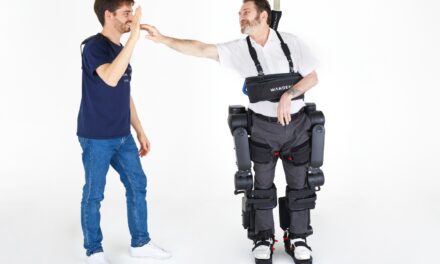The majority of participants in a multi-center clinical study of the ReStore Soft Exo-Suit for the rehabilitation of individuals with lower limb disability due to stroke achieved meaningful walking speed improvements, according to ReWalk Robotics Ltd, in a media release.
The study examined patient safety and explored functional walking outcomes in stroke survivors who completed a series of gait training sessions with the ReStore device.
This research was conducted primarily to support the Company’s successful application to the U.S. Food and Drug Administration (FDA) for clearance of the ReStore Exo-Suit, which was issued in June 2019. The company also received CE Marking for the device in May 2019.
The study’s findings were published in the June issue of the Journal of NeuroEngineering and Rehabilitation, and were the result of investigation by five leading U.S. rehabilitation institutions:
- Shirley Ryan AbilityLab in Chicago;
- Spaulding Rehabilitation Hospital in Boston, in partnership with Boston University College of Health and Rehabilitation Sciences: Sargent College;
- MossRehab Stroke and Neurological Disease Center in Elkins Park, Pa;
- TIRR Memorial Hermann in Houston; and
- Kessler Foundation in West Orange, NJ.
“This multi-site clinical trial of the safety and feasibility of the ReStore Exo-Suit is an important milestone in the field of rehabilitation technology,” Lou Awad, PT, DPT, PhD, Director of Boston University’s Neuromotor Recovery Laboratory and the site investigator at Spaulding Rehabilitation Hospital for this study, says in the release.
“Physical therapists have historically relied on passive assistive devices to help patients with post-stroke hemiparesis walk safely. As an active assistive device, the ReStore soft robotic exo-suit offers new opportunities to retrain walking after stroke.”
Thirty-six study participants with hemiplegia due to stroke each completed seven total study visits with the ReStore Exo-Suit. In addition to establishing device safety, which was the primary outcome for the study, several exploratory outcome measures were investigated, including a pre- and post-assessment of walking speeds, in which 64% of participants increased their unassisted walking speed by a clinically meaningful margin, the release continues.
Related Stories:
ReWalk Robotics Initiating Clinical Studies of Restore Exoskeleton for Stroke Patients
ReWalk Robotics Introduces Exoskeleton Designed for Stroke Patients
Wyss Institute Collaborating with ReWalk Robotics to Develop Soft Exosuit
“We are thrilled to see the results from the ReStore clinical trial being published in a joint paper authored by the primary investigators from all five of our highly regarded study sites,” says Kathleen O’Donnell, Director of Product Management and Strategy at ReWalk Robotics, headquartered in Marlborough, Mass.
“This work summarizes the first results from the largest soft exo-suit trial to date, and the positive findings in terms of safety and improved walking speeds showcase the potential of this technology to dramatically impact patient outcomes post stroke,” she adds.
The first-of-its-kind ReStore Exo-Suit was unveiled in 2017 and was designed to be a versatile, cost-effective gait therapy solution to train for improved gait by providing coordinated plantarflexion and dorsiflexion assistance to a patient’s impaired foot and ankle, according to the company.
[Source(s): ReWalk Robotics Ltd, PR Newswire]




